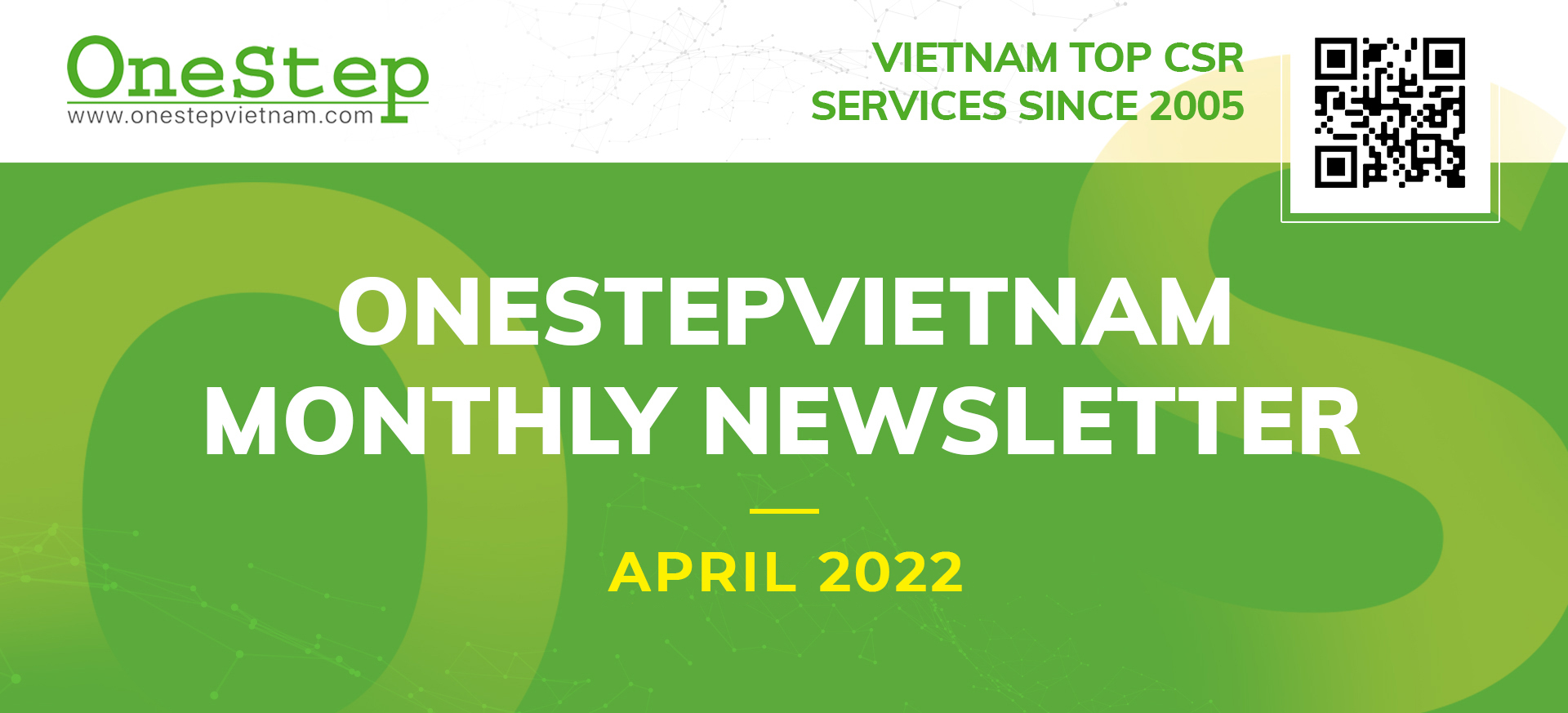Bản tin hàng tháng OneStepVietnam – Tháng 4/2022

COVID-19 and ECONOMIC NEWS
As of April 30, 2022 Vietnam’s Ministry of Health confirmed a total of 10,649,809 cases of infection in 62 cities and provinces in the country. The number of infected cases decreases rapidly form 6,118,272 cases in March 2022 to 1,088,052 cases during this month. The most severely hit areas are Ha Noi City, Ho Chi Minh City (HCMC), Nghe An Province, Bac Giang province and Binh Duong Province.
There were 43,042 deaths announced due to the pandemic as of April 30, 2022. On the other hand, around 9,264,366 patients were given the all-clear recoveries during the same time period.
In the first four months, total export and import values were estimated at US$122.36 billion and US$119.83 billion, respectively up 16.4 percent and 15.7 percent against the same period last year. The nation’s industrial production expanded 9.4 percent in April and 7.5 percent in the first four months.
Source: Ministry of Health and Online Newspaper of the Government of the Socialist Republic of Vietnam
NEW LEGAL REQUIREMENTS
A. Resolution No. 17/2022/UBTVQH15 on Annual and Monthly Overtime Hours Ensuring Covid-19 Prevention and Control, Socio-Economic Recovery and Development
The resolution was issued on March 23, 2022 and came into force from April 01, 2022.
1. Annual overtime hours
Employers are permitted to assign their employees to work overtime for over 200 hours but not more than 300 hours per year if this is agreed upon by both the employer and the employees, except the following cases:
a) Employees aged between 15 and under 18;
b) Employees having mild disabilities with work capacity reduction of least 51% or employees with severe disabilities or extremely severe disabilities;
c) Employees doing arduous, hazardous, dangerous or extremely arduous, hazardous or dangerous works;
d) Female employees in their 7th month of pregnancy onward (or the 6th month of pregnancy onward in case they work in the highlands, remote areas, bordering areas or islands);
dd) Lactating employees whose children aged under 12 months.
This Article does not apply to the cases specified in Clause 3 Article 107 of the Labor Code, which includes manufacture, processing of textile, garment, footwear, electric, electronic products, processing of agricultural, forestry, aquaculture products, salt production. Remark: these cases are allowed to work overtime maximum 300 hours in a year as mentioned in currently applicable law.
2. Monthly overtime hours
Employers that are permitted to assign their employees to work overtime for up to 300 hours per year may assign their employees to work overtime for more than 40 hours but not exceeding 60 hours per month if this is agreed upon by both the employer and the employees.
3. Responsibilities of employers
When organizing overtime work exceeding 200 hours but not exceeding 300 hours per year, employers shall:
– Comply with other regulation mentioned in Labor code and relevant documents (e.g. overtime working hours per day, overtime payment, employee’s agreement to work overtime.)
– Send notification to the Departments of Labor, War Invalids and Social Affairs as required by Decree No. 145/2020/ND-CP dated December 14, 2020.
B. Circular No. 29/2021/TT-BLDTBXH promulgates work classification standards based on working conditions
1. Purpose of work classification methods based on working conditions attached to this Circular:
– Develop, amend, add, or remove occupations from the List of arduous, toxic, and dangerous occupations and very arduous, toxic, and dangerous occupations (hereinafter referred to as “List of occupations”).
– Classify work based on working conditions for List of occupations within the responsibilities of employers in order to provide labor protection and healthcare for employees in accordance with Clause 3 Article 22 of the Law on Occupational Safety and Hygiene.
2. Amendment, addition, or removal of occupations from the List of occupation
Based on work classification results produced by methods under this Circular, if an occupation needs to be amended, added, or removed from the List of occupation, employer shall submit the request to the Ministry overseeing the sector and Ministry of Labor – War Invalids and Social Affairs.
3. Organizations engaging in working condition classification
Organizations engaging in working condition classification must be eligible for engaging in working environment monitoring activities in accordance with the Law on Occupational Safety and Hygiene.
4. Responsibilities of employers and relevant agencies
– Employers shall review, assess, and classify work initially and in case of any change to technology, production procedures which lead to changes in working conditions and when discovering new hazardous, dangerous factors which were not discovered in the previous assessment session as long as working condition review, assessment, and classification are conducted once every 5 years.
– Regarding occupations in the List of occupation where employers have adopted measures to reduce or eliminate arduous, toxic, hazardous factors at workplace, the employers shall organize assessment, and classification and request the Ministry of Labor – War Invalids and Social Affairs to comment on the work assessment and classification results. In this case, attach documents under Clause 2 Article 9 hereof.
– Employers and relevant agencies, organizations are responsible for providing adequate policies for employees engaging in List of occupations as per relevant laws.
– If occupations that have been assessed and classified in accordance with Clause 2 of this Article lost the characteristic working conditions of an arduous, toxic, and hazardous occupation or a very arduous, toxic, and hazardous occupation, employers are not required to implement policies for employees engaging in such occupations after consulting Ministry of Labor – War Invalids and Social Affairs.
Source:Thuvienphapluat
ONESTEPVIETNAM NEWS
All assessors of OneStepVietnam are vaccinated and now allowed to travel in all areas of Vietnam. We have conducted in-person assessments as usual, remote services including consultation and virtual assessment will still be conducted for some factories during April 2022.
OneStepVietnam team – April 2022